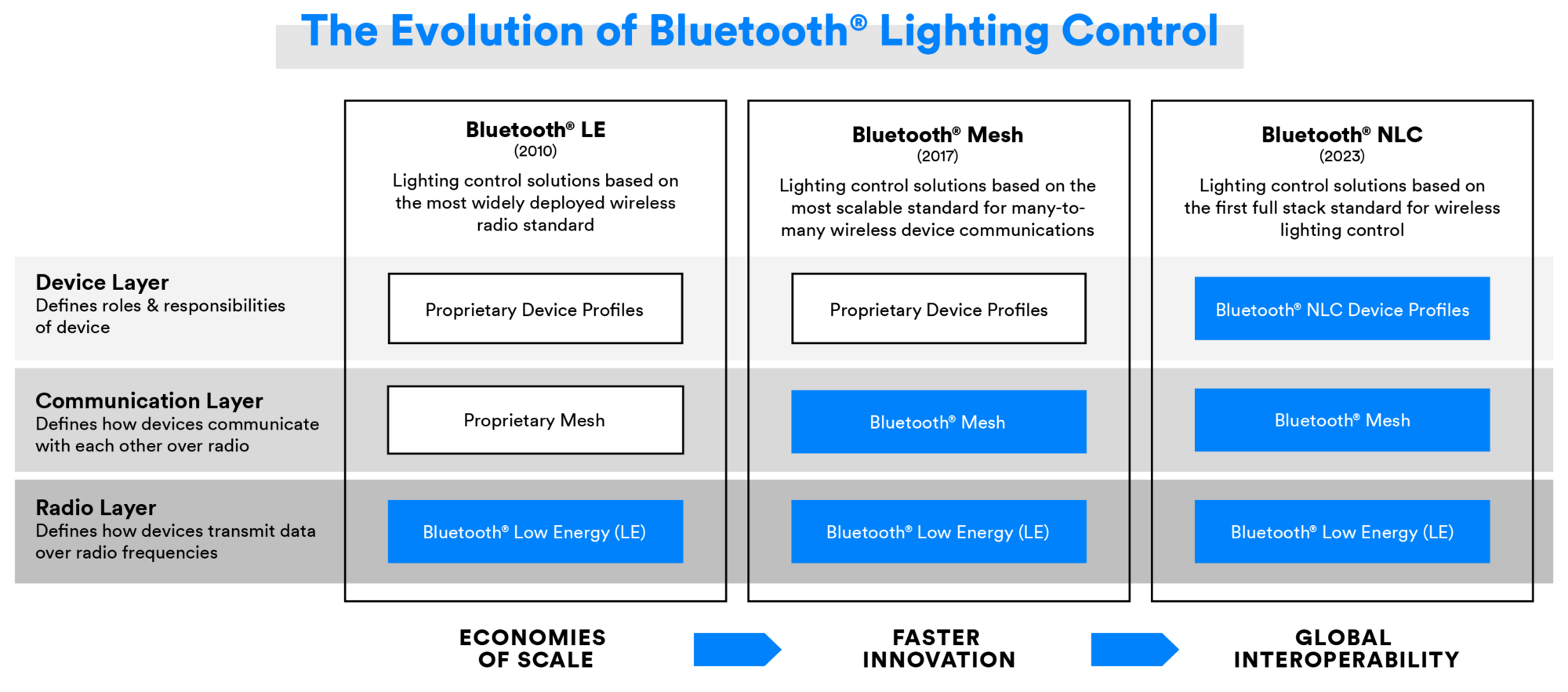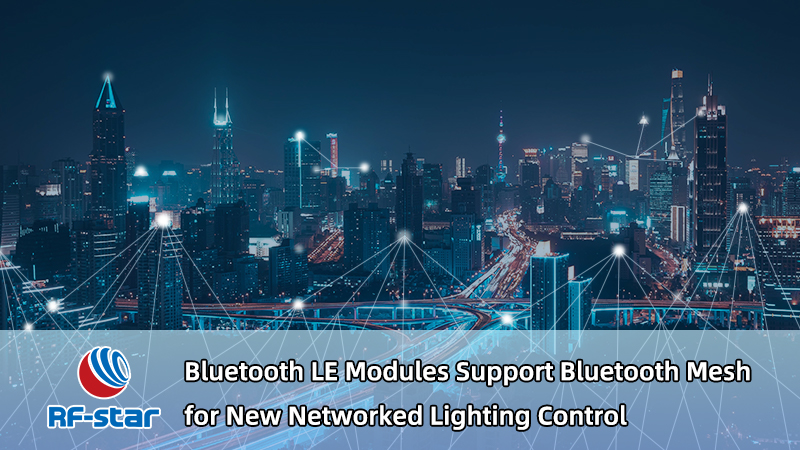The Bluetooth Special Interest Group (SIG) recently announced the completion of Bluetooth Networked Lighting Control (NLC), the first full-stack standard for wireless lighting control.
Let’s delve into the concept of Bluetooth NLC, its evolution, benefits, new Bluetooth mesh features and how to support commercial and industrial lighting using RF-star Bluetooth Mesh modules.
What is Bluetooth NLC?
As Bluetooth SIG mentioned, Bluetooth Networked Lighting Control (NLC) is the only full-stack standard for wireless lighting control covering standardization on the radio layer, the protocol layer, and the device layer. By offering standardization, Bluetooth NLC achieves energy efficiency without compromising a building’s occupant experience and improves the operation of building systems, as well as enables multi-vendor interoperability and mass adoption of wireless lighting control.
The standardization of Bluetooth lighting control cannot be realized without the support and contribution of Bluetooth Low Energy (LE) and Bluetooth Mesh.
Evolution of Bluetooth Lighting Control

Figure 1 Evolution of Bluetooth Lighting Control (source from SIG)
More than ten years ago, the lighting industry started the journey of standardizing wireless lighting control using Bluetooth technology. Initially, they utilized Bluetooth Low Energy (LE) for the radio layer and later adopted Bluetooth Mesh to standardize the communication layer. The recent release of the new Bluetooth NLC Profile Specifications focuses on standardization at the device layer, thus achieving the full-stack Bluetooth NLC standard.
With new enhancements and profiles released by the SIG, the commercial and residential lighting controls market has more potential and a countless number of luminaire manufacturers will create multiple and interoperable lighting control projects with Bluetooth mesh technology.
Why is the new wireless lighting control extremely sure to be global mainstream adoption? There are a few key reasons why Bluetooth NLC is the preferred technology for both lighting manufacturers and buyers.
Benefits That Bluetooth NLC Brings to Lighting Suppliers and Buyers

Figure 2 RF-star Bluetooth LE Modules Support Bluetooth Mesh for New NLC
The evolution of a standardized lighting control means the growth of an interoperable Bluetooth ecosystem. Essentially, Bluetooth NLC eliminates the need for proprietary technologies and allows developers to focus on value-added features and capacities. The cost of development will drop while more innovative lighting products or systems may emerge in the market.
Bluetooth NLC expands the supplier opportunity by instilling buyer confidence and increasing the possibility of adoption. Besides, it also enables additional revenue models by utilizing the same Bluetooth radio for advanced building services that bring benefits beyond illumination, such as indoor navigation, space utilization, and asset tracking.
The great contribution of the Bluetooth mesh wireless networked lighting is to allow customers with freedom to choose from a variety of products across different vendors. The full cross-vendor interoperability of products integrated Bluetooth mesh devices can make wireless Bluetooth nodes work seamlessly with each other.
The popularity of Bluetooth technology in smartphones and tablets facilitates users to install and operate these terminal lighting devices. The remote provisioning feature further simplifies adding new devices or maintenance of existing devices. Moreover, Bluetooth NLC lighting solutions have a decentralized control architecture, eliminating the need for centralized controllers and making them easily reconfigurable and scalable to accommodate changing needs.
Obviously, with the introduction of Bluetooth NLC, the potential of the wireless lighting control market will be fully exploited, and loads of use cases for building automation and industrial applications will also emerge.
RF-star, a forerunner in wireless connectivity, especially experienced in Bluetooth Low Energy, is keeping up with the new Bluetooth NLC to support users tapping the great potential of fully standardized Bluetooth Mesh for lighting applications.
New Bluetooth Mesh Features Now Accessible on RF-star Bluetooth LE Modules
Here are these new Bluetooth Mesh features on RF-star Bluetooth low-energy devices.
RF-star Bluetooth LE modules and SDKs support these new Bluetooth mesh features, including BG22, BG24, MG24, nRF52832, nRF52833, nRF52840, and CC2652R series modules.